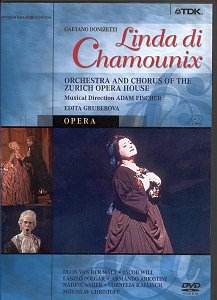Here is a useless piece of information. Of Donizetti’s
huge output over one third of the operas’ titles include women’s
names. As Michael Caine once famously said, "Not many people
know that". I do because, sad though it may seem, I looked
it up. But how many of those do you know? Well there is Elizabeth
(Queen), Maria (Stuart), Anna (Boleyn), even Emily
(Liverpool) and, of course, Lucia (Lammermoor). But Linda
may come as a surprise to some (and I bet you didn’t know there
was a Rita. Rita?!).
Those who watch this DVD of Zurich Opera’s production
of Linda for the first time may well wonder why the work
is not firmly in the repertory, holding its own with Lucia
and L’elisir d’amore. After all, it was ecstatically received
at its first performance in Vienna in 1842, the already famous
composer taking 17 curtain calls. Thereafter it had a rampaging
success throughout Europe. Dramatically it is conventionally sound
with a good old-fashioned tale of aristocratic sexual exploitation
set against genuine love during the course of which Linda loses
her sanity. Donizetti, incidentally, thought the mad scene superior
to the one he wrote for Lucia. In the end, all turns out
happy ever after.
There is much marvellous music and the Zurich
team does it fine justice. Linda’s entry, dramatically delayed
until nearly 20 minutes from the beginning (from curtain-up, that
is). The fine overture is missing in this recording, perhaps justified
through it being a later, revisionist addition of Donizetti’s.
She opens with some tuneful recitative leading to a deliciously
joyful scherzoesque aria. In 1996, when this recording was made,
Edita Gruberova was already – shall we say – in the Indian Summer
of her career. Thus, to look at, she may not easily convince as
the young damsel Linda but on hearing her sing this first number
it is easy to be convinced that there can be no-one better to
sing it. Just listen to her effortless negotiation of hair-raising
coloratura, the seemingly infinite gradations of tone and dynamic
and the perfectly judged flexibility of phrasing. As the opera
progresses it becomes clear that this is as virtuoso a coloratura
role as any Donizetti wrote.
But this is no one-woman performance. As lover
and father, Deon van der Walt and Armando Ariostini respectively
sing with satisfying lyricism and as the nasty Marquese, Jacob
Will gives a punchy account with vivid acting that just manages
to stop short of over-caricature. The production is a well integrated
ensemble affair – so often the case at Zurich – and the stage
designs are in the pleasing, no-nonsense category. Adam Fischer
conducts with sensitive dependability.
The performance is preceded by a helpful sub-titled
synopsis which introduces the characters in visual context. It
opens by telling us that the villagers are preparing for their
Winter migration to Paris over Mont Blanc. Well I have taken the
cable car from Chamonix over the Mont Blanc Massif and that took
me into Italy. Something awry with the geography here!
John Leeman
